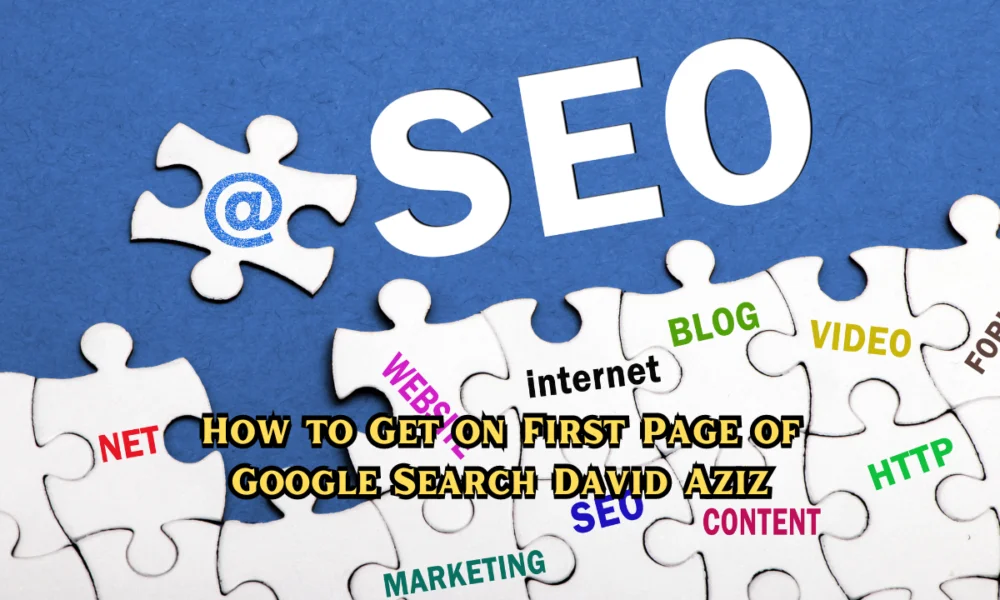Understanding Google’s Search Algorithm
Google’s search algorithm is a complex system designed to retrieve relevant information from its vast index and present it to users within seconds of their queries. The core principles that govern this algorithm include relevance, authority, and content quality. Understanding how these factors work together is crucial for anyone looking to improve their website’s ranking and ultimately learn how to get on first page of Google search David Aziz.
Relevance pertains to how closely the content on a webpage aligns with the search query entered by users. Google utilizes various techniques, including keyword analysis and semantic searches, to determine if a webpage matches the user’s intent. This emphasizes the importance of content that not only includes the right keywords but also addresses the topics and queries that users are searching for in depth.
Authority, on the other hand, reflects the credibility of the website. Factors such as the number and quality of backlinks from reputable sources play a significant role in establishing a site’s authority. Websites that are deemed authoritative are more likely to rank higher on the SERPs. Therefore, building a solid backlink profile is essential for those pursuing techniques on how to get on first page of Google search David Aziz.
Finally, the quality of content is paramount. High-quality, informative, and engaging content is favored by the algorithm, which leads to better user retention and lower bounce rates. This creates a positive feedback loop that reinforces a website’s ranking efficacy over time. Moreover, it is essential to stay updated with recent algorithm changes, as Google regularly adjusts its algorithms to enhance user experience. Ignoring these updates can hinder your website’s performance and effectiveness in SEO efforts.
Keyword Research and Targeting
Keyword research stands as a foundational element in the quest to enhance online visibility and ultimately learn how to get on first page of Google search David Aziz. Focusing on high-traffic keywords relevant to your niche can significantly impact your ability to attract targeted traffic. To begin, various tools are available for conducting in-depth keyword analysis. Platforms such as Google Keyword Planner, SEMrush, and Ahrefs provide valuable insights, allowing you to identify keywords with substantial search volume and moderate competition.
When selecting keywords, it is prudent to consider long-tail keywords, which generally consist of three or more words. These keywords often reflect specific user intent and typically face less competition compared to broader searches. For instance, instead of merely targeting “SEO,” a more specific long-tail keyword could be “how to get on first page of Google search David Aziz.” This approach not only refines your audience but also enhances the likelihood of conversion.
Effective integration of identified keywords into your content requires a strategic approach. Begin by incorporating high-priority keywords within key sections of your webpage, such as the title, headings, and meta descriptions. Maintaining a natural flow in your writing, while subtly including these terms, ensures that your content remains engaging and reader-friendly. It is important to avoid keyword stuffing, as search engines have evolved to prioritize content quality over quantity.
Ultimately, the broader goal of keyword targeting is to optimize your content for search engines while addressing the needs of your audience. By engaging in thorough keyword research and focusing on long-tail variations, you can better position yourself to achieve higher rankings and improve overall website traffic. Careful attention to these details will guide you closer to mastering how to get on first page of Google search David Aziz.

Content Creation and Optimization Techniques
Creating high-quality content is pivotal when aiming to achieve visibility on the first page of Google search results. One of the core elements is understanding your target audience. Identifying their preferences, pain points, and interests allows you to develop content that not only attracts attention but also offers value. This alignment enhances user engagement, which search engines like Google prioritize in their ranking algorithms.
To optimize your content effectively, you must pay attention to several on-page elements. Start with headers; they should be descriptive and include relevant keywords naturally. This not only aids search engine bots in understanding your content better but also helps readers navigate your articles with ease. Additionally, write compelling meta descriptions that summarize your content succinctly. A well-crafted meta description can significantly improve click-through rates from search results.
Another essential aspect of content optimization is the use of image alt texts. Incorporating relevant keywords in alt texts not only improves accessibility for users with screen readers but also boosts your content’s SEO. When images are properly described, it increases the likelihood of ranking in Google Image Search, further enhancing your overall visibility.
Moreover, maintaining a consistent publishing schedule is crucial. Regularly updating your website with fresh content signals to search engines that your site is active and relevant. This can be beneficial in improving your ranking over time. Furthermore, with an increasing number of users accessing the web on mobile devices, mobile optimization is non-negotiable. Ensure that your website and its content are mobile-friendly, as this can significantly impact user retention and engagement.
In conclusion, focusing on high-quality, well-optimized content creation, combined with a regular publishing schedule and mobile optimization, will position you favorably in your quest to learn how to get on the first page of Google search David Aziz. Implementing these strategies enhances not just visibility but also user experience, leading to sustained engagement with your content.
Building High-Quality Backlinks
Backlinks are a critical component in the quest to understand how to get on the first page of Google search. They act as votes of confidence from one site to another, signaling to search engines that the content is reputable and valuable. However, not all backlinks are created equal; the difference between high-quality and low-quality backlinks can greatly influence your search engine ranking. High-quality backlinks usually originate from authoritative websites relevant to your niche, while low-quality backlinks can stem from spammy or irrelevant sites, which can harm your reputation and SEO efforts.
To effectively build high-quality backlinks, one of the foremost strategies is guest posting. This involves writing and publishing an article on another website, which typically includes a backlink to your site within the content. By contributing valuable insights or research, you can reach a new audience while enhancing your backlink profile. Additionally, building relationships within your industry can lead to organic backlink opportunities. Networking with thought leaders and other influencers can facilitate mutual promotion and collaborations, allowing for more good-quality links to your site.
Leveraging social media is another powerful method for acquiring backlinks. Sharing your content across various platforms not only drives traffic to your site but also increases the likelihood of others linking back to it. Engaging with communities relevant to your industry can lead to natural backlinking as users share your valuable resources. For instance, a tech blog might receive backlinks from online communities discussing innovative technologies after sharing insightful content. By employing a combination of these strategies, you can significantly improve your chances of attaining a better position in search engine results and ultimately achieve the objective of how to get on first page of Google search David Aziz.
You May Also Read
